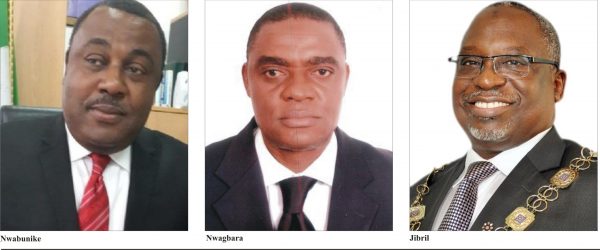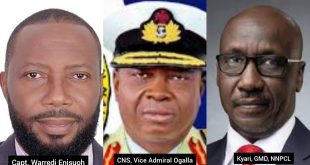 By Kenneth Jukpor
By Kenneth Jukpor
Nigerian seaports have observed commendable transformation since they were concessioned in 2006. Some areas which recorded success include; efficiency, automation, turnaround time, security, among others, however, the concession also brought about problems of arbitrary charges, divested and conflicting roles of some operators, conflict between the Nigerian Ports Authority (NPA) and the concessionaires on certain aspects of the concession agreement on port infrastructure, draft of channels, etc.
One would expect that the failures in the maiden concession plan, a result of the shoddy and covert concession process, would be sufficient motive for the ongoing review to be all-inclusive with regards getting all relevant stakeholders make input in the review.
Given that NPA has reneged on some of its obligations in the agreement with the concessionaires on the aspect of dredging, power supply, security, water and other services the terminal operators provide for themselves, it is shocking that the ongoing review hasn’t included transport experts, or any category of port stakeholders except NPA and the terminal operators.
Freight forwarders, maritime lawyers, transport institutes, the port economic regulator, shippers, the maritime media, among others have been jettisoned in this crucial port arrangement or rearrangement.

In John C. Maxwell’s popular book titled, “Failing Forward” he said; “fail early, fail often, but always fail forward”. Nigerian port system failed early with the concession of the ports taking place before the emergence of a port economic regulator which is Nigerian Shippers’ Council (NSC), but the nation is unwilling to take Maxwell’s advice to fail forward by learning from its previous failures.
NPA has reiterated that it has been working assiduously to ensure that the ongoing port concession agreement is concluded speedily and comprehensively, however, lack of stakeholders’ input is clear indication that the ongoing review may not expunge the numerous challenges which plagued the maiden agreement.
During an exclusive chat with MMS Plus last week, the President of the Chartered Institute of Logistics and Transport (CILT) Nigeria, Mr. Ibrahim Jibril stressed that port stakeholders must be involved in the ongoing port concession review to make the results meaningful.
According to Jibril, failure to bring in stakeholders in the process would result in more problems after the review has been concluded.
“We ought to realize that the actions and inactions of people at the ports have an impact on the operations of the ports. If other stakeholders were involved in the first concession exercise, someone would have brought up the issue for port access roads to be considered. Someone would have stressed the need to have designated port area where movement is controlled” he said.
Jibril lamented that the last time the concession agreement was discussed no one factored in the social repercussion of the concession agreement following the removal of crucial port facilities like truck parks, container holding bays, etc.
“It is important that we realize that there is a social angle and human angle to this concession agreement. These are the issues that would come up if more stakeholders are allowed to be involved in the review of the concession agreement. The place of dockworkers would be clearly outlined, the issue of port access roads, designated port environment would be analyzed” he added.
He stressed that stakeholders like Shippers’ Council, Nigerian Maritime Administration and Safety Agency (NIMASA) and professional bodies like CILT should be involved to have a holistic approach to the port concession review.
Meanwhile, the Association of Nigeria Licensed Customs Agents (ANLCA) has labeled the ongoing port concession review a ‘scam’.
The Association stated that it has taken the problem of lack of stakeholders engagement in the sector to the Vice President, Prof. Yemi Osinbajo.
The President of ANLCA, Mr. Tony Iju Nwabunike told our correspondent that beyond the issues with the port concession, there were several challenges at the Nigerian ports which arose as a result of neglecting key stakeholders in policy formulation.
“How can the port be under concession for almost thirteen years and we don’t know the details. The review of the agreement is ongoing and we don’t know who is responsible, where it is taking place and how? Freight forwarders are not privileged to know what the concession agreement is all about. Shippers Council doesn’t know about it too. So, who is part of it? Who are the stakeholders involved?”
“We have taken these challenges to the vice president who is actually talking about the ease of doing business. I asked him that there is ease of doing business and you are not contacting the stakeholders to do thing right. Who is this stakeholder that is taking care of the concession? I think it’s a scam and it should be reviewed”, he said.
However, he disclosed that ANLCA as well as other stakeholders were putting efforts to know about the ongoing review but they have not been given the opportunity.
Correspondingly, the Managing Partner, Maritime & Commercial Law Partners, Barr. Emmanuel Nwagbara shared the same view during an exclusive chat with MMS Plus, as he noted that the ongoing review without the input of stakeholders wouldn’t proffer enduring solutions.
“Any review that wouldn’t involve the input of stakeholders in the port industry wouldn’t go far. Shippers, NPA, Shippers’ Council, Terminal Operators and maritime lawyers are also stakeholders because we identified legal issues in the agreement which also needs to be addressed. I would suggest to the parties involved in the review to include other stakeholders including Shippers’ Council which is very necessary in the review committee”
“An effective port industry would make better development of the law and certainty of the law. There are issues now that were not captured in the concession agreement and there hasn’t been any regulation to take care of them” he said.
The legal expert also expressed worry that the fact that NPA is a party to that agreement shows that there could be conflict of interest which needs to be properly addressed if it should set up a monitoring committee.
Recall that the Managing Director of NPA, Ms. Hadiza Bala-Usman said, “There aspects of the concession that are confidential between NPA and the concessionaire. We cannot reveal those aspects to stakeholders. There are aspects that stakeholders are concerned and those aspects would be discussed with the stakeholders at the appropriate time. There is a confidentiality clause which does not permit us to disclose certain aspects of the agreement and we are abiding by it”
Reemphasizing the need for stakeholders’ engagement in policy formulation and key decision making in the port sector, the Customs Area Controller (CAC) Murtala Mohammed Airport, Comptroller Shoboiki Jayne told MMS Plus that the industry had suffered grossly as a result of the problem.
Shoboiki who was speaking with our correspondent in Ikeja, maintained that the ease of doing business agenda of the government would remain a pipe dream until government agencies embrace the strategy of robust stakeholders’ engagement.
 MMS PLUS NG – Maritime, Aviation, Business, Oil and Gas News Online Newspaper with coverage in Maritime, Oil and Gas, Aviation, Power and Energy as well as Financial News
MMS PLUS NG – Maritime, Aviation, Business, Oil and Gas News Online Newspaper with coverage in Maritime, Oil and Gas, Aviation, Power and Energy as well as Financial News









